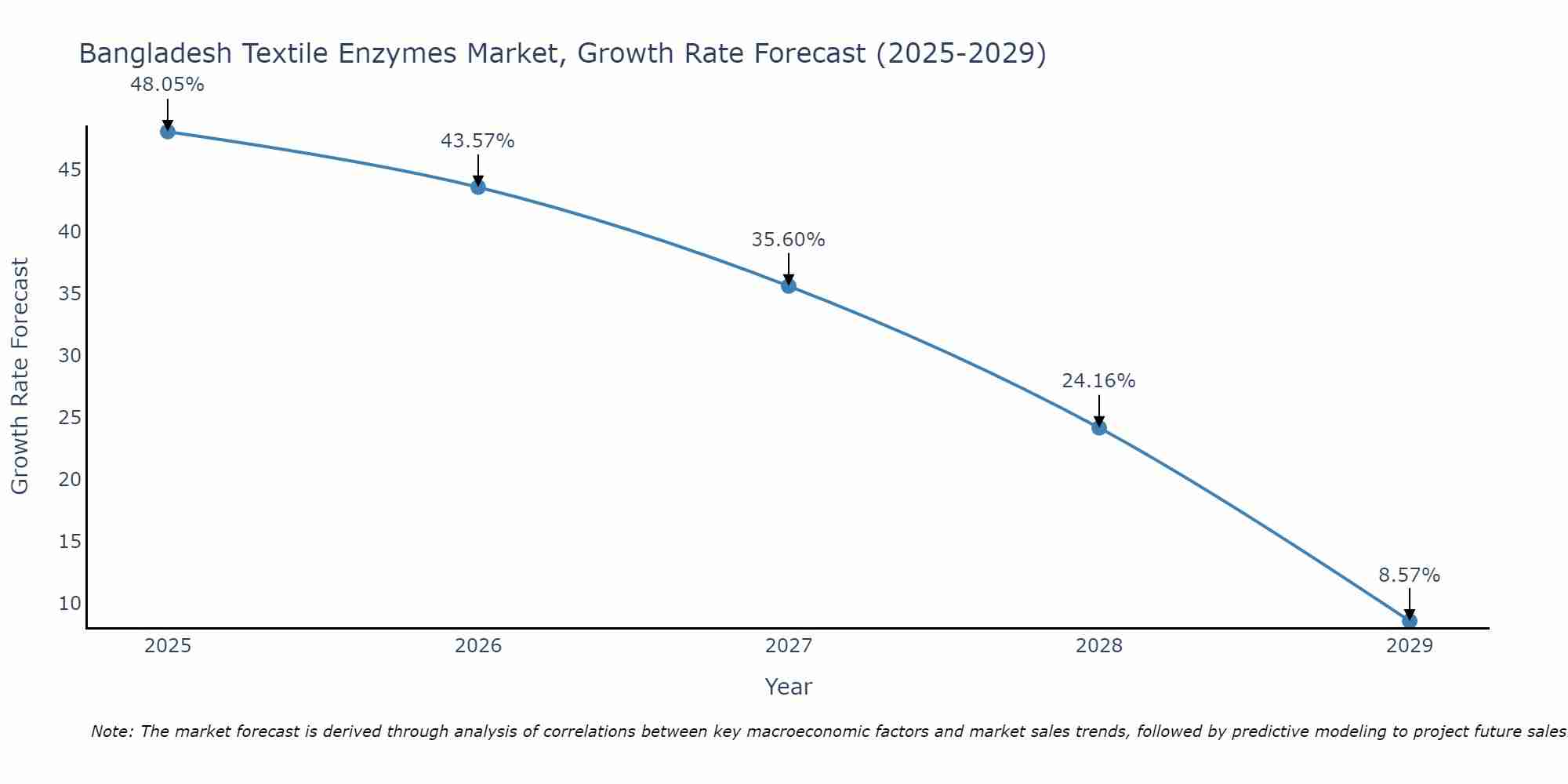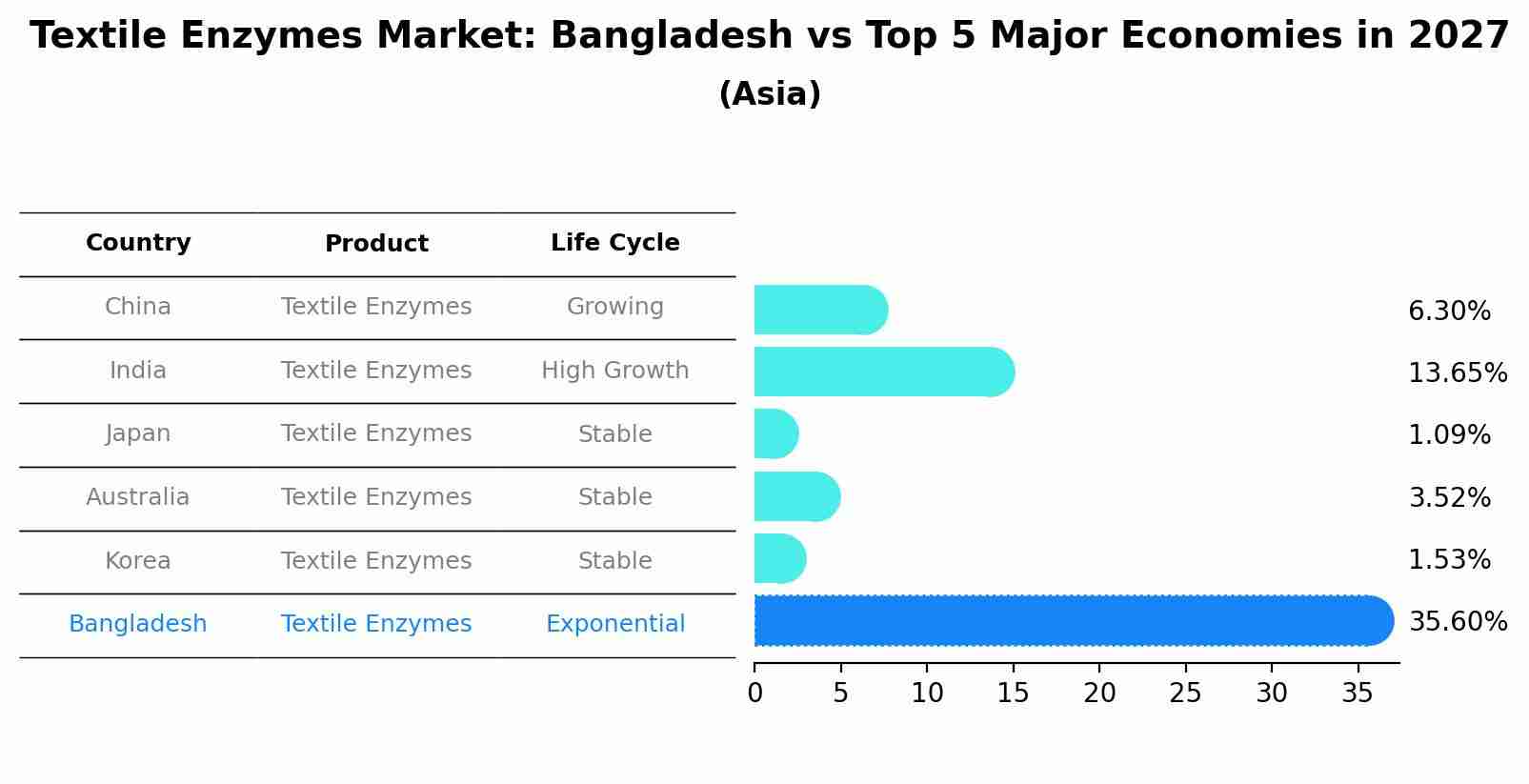Bangladesh Textile Enzymes Market (2025-2031) Outlook | Revenue, Forecast, Analysis, Companies, Industry, Growth, Trends, Size, Value & Share
| Product Code: ETC094071 | Publication Date: Jun 2021 | Updated Date: Jun 2025 | Product Type: Report | |
| Publisher: 6Wresearch | Author: Ravi Bhandari | No. of Pages: 70 | No. of Figures: 35 | No. of Tables: 5 |
Bangladesh Textile Enzymes Market Size Growth Rate
The Bangladesh Textile Enzymes Market may undergo a gradual slowdown in growth rates between 2025 and 2029. Beginning strongly at 48.05% in 2025, growth softens to 8.57% in 2029.

Textile Enzymes Market: Bangladesh vs Top 5 Major Economies in 2027 (Asia)
The Textile Enzymes market in Bangladesh is projected to grow at a exponential growth rate of 35.60% by 2027, highlighting the country's increasing focus on advanced technologies within the Asia region, where China holds the dominant position, followed closely by India, Japan, Australia and South Korea, shaping overall regional demand.

Bangladesh Textile Enzymes Market Overview
The Bangladesh Textile Enzymes Market is witnessing steady growth driven by the increasing demand for sustainable textile production processes. Enzymes play a crucial role in the textile industry by offering eco-friendly solutions for processes such as desizing, bio-polishing, and denim finishing. The market is characterized by the presence of key players offering a wide range of enzyme products tailored to the specific needs of textile manufacturers. Factors such as the growing awareness regarding environmental sustainability, stringent regulations promoting eco-friendly practices, and the emphasis on product quality are fueling the adoption of textile enzymes in Bangladesh. Additionally, advancements in enzyme technology, research and development initiatives, and collaborations between industry stakeholders are further contributing to the expansion of the Bangladesh Textile Enzymes Market.
Bangladesh Textile Enzymes Market Trends
The Bangladesh Textile Enzymes Market is witnessing a shift towards sustainable and eco-friendly products driven by increasing awareness of environmental issues. Enzymes used in textile processing are being preferred over traditional chemicals due to their biodegradability and lower environmental impact. Key trends include the adoption of enzymatic processes for various stages of textile production such as desizing, scouring, and bio-polishing to reduce water and energy consumption while enhancing the quality of finished fabrics. Manufacturers are also focusing on developing enzyme formulations that are more efficient, versatile, and cost-effective to meet the growing demand for environmentally friendly solutions in the textile industry. Overall, the Bangladesh Textile Enzymes Market is experiencing a gradual but steady transition towards sustainable practices to meet consumer demands and regulatory requirements.
Bangladesh Textile Enzymes Market Challenges
The Bangladesh Textile Enzymes Market faces several challenges, including fluctuating raw material prices, strict environmental regulations, and increasing competition from international players. The industry is heavily dependent on imported enzymes, making it vulnerable to currency fluctuations and supply chain disruptions. Additionally, compliance with environmental standards poses a significant challenge as the government continues to tighten regulations on wastewater treatment and chemical usage. The market is also witnessing a rise in competition from foreign companies offering advanced enzyme solutions, putting pressure on local manufacturers to innovate and differentiate their products. Overall, navigating these challenges requires textile enzyme companies in Bangladesh to invest in research and development, sustainable practices, and efficient supply chain management to remain competitive in the global market.
Bangladesh Textile Enzymes Market Investment Opportunities
The Bangladesh Textile Enzymes Market presents promising investment opportunities due to the growing demand for eco-friendly and sustainable textile production processes. Enzymes are widely used in the textile industry to achieve various effects such as bio-polishing, desizing, and stone washing, leading to improved fabric quality and reduced chemical usage. With increasing awareness about environmental issues and regulations promoting sustainable practices, the demand for textile enzymes is expected to rise. Investing in companies that manufacture and supply textile enzymes, as well as research and development in innovative enzyme technologies, could prove to be lucrative in this growing market. Additionally, partnerships with textile manufacturers in Bangladesh seeking to improve sustainability in their production processes could also be a strategic investment opportunity.
Bangladesh Textile Enzymes Market Government Policy
In Bangladesh, the government has implemented various policies to support the textile enzymes market. These policies focus on promoting sustainable practices, enhancing product quality, and ensuring compliance with international standards. The government has established regulatory frameworks to oversee the production, import, and use of enzymes in the textile industry, aimed at ensuring environmental sustainability and worker safety. Additionally, there are incentives and subsidies provided to encourage the adoption of enzymatic processes in textile manufacturing, promoting innovation and competitiveness in the market. The government also emphasizes the importance of research and development in this sector, supporting initiatives to develop new enzyme technologies and improve efficiency in textile production processes. Overall, the government policies in Bangladesh aim to create a conducive environment for the growth and development of the textile enzymes market.
Bangladesh Textile Enzymes Market Future Outlook
The future outlook for the Bangladesh Textile Enzymes Market appears promising, driven by factors such as increasing demand for sustainable and eco-friendly textile processing solutions, growing awareness about the benefits of enzymatic processing in improving efficiency and reducing environmental impact, and a rising trend towards adopting green practices in the textile industry. With advancements in enzyme technology, the market is expected to witness further innovation in enzyme formulations tailored for specific textile processing applications, leading to improved performance and cost-effectiveness. Additionally, the government`s initiatives to promote the textile sector and attract foreign investments are likely to create growth opportunities for enzyme manufacturers and suppliers in Bangladesh. Overall, the Bangladesh Textile Enzymes Market is poised for steady growth in the coming years.
Key Highlights of the Report:
- Bangladesh Textile Enzymes Market Outlook
- Market Size of Bangladesh Textile Enzymes Market, 2021
- Forecast of Bangladesh Textile Enzymes Market, 2031
- Historical Data and Forecast of Bangladesh Textile Enzymes Revenues & Volume for the Period 2021 - 2031
- Bangladesh Textile Enzymes Market Trend Evolution
- Bangladesh Textile Enzymes Market Drivers and Challenges
- Bangladesh Textile Enzymes Price Trends
- Bangladesh Textile Enzymes Porter's Five Forces
- Bangladesh Textile Enzymes Industry Life Cycle
- Historical Data and Forecast of Bangladesh Textile Enzymes Market Revenues & Volume By Type for the Period 2021 - 2031
- Historical Data and Forecast of Bangladesh Textile Enzymes Market Revenues & Volume By Cellulase for the Period 2021 - 2031
- Historical Data and Forecast of Bangladesh Textile Enzymes Market Revenues & Volume By Amylase for the Period 2021 - 2031
- Historical Data and Forecast of Bangladesh Textile Enzymes Market Revenues & Volume By Catalase for the Period 2021 - 2031
- Historical Data and Forecast of Bangladesh Textile Enzymes Market Revenues & Volume By Pectinase for the Period 2021 - 2031
- Historical Data and Forecast of Bangladesh Textile Enzymes Market Revenues & Volume By Laccase for the Period 2021 - 2031
- Historical Data and Forecast of Bangladesh Textile Enzymes Market Revenues & Volume By Others for the Period 2021 - 2031
- Historical Data and Forecast of Bangladesh Textile Enzymes Market Revenues & Volume By Application for the Period 2021 - 2031
- Historical Data and Forecast of Bangladesh Textile Enzymes Market Revenues & Volume By Bio-polishing for the Period 2021 - 2031
- Historical Data and Forecast of Bangladesh Textile Enzymes Market Revenues & Volume By Desizing for the Period 2021 - 2031
- Historical Data and Forecast of Bangladesh Textile Enzymes Market Revenues & Volume By Enzymatic Bleaching for the Period 2021 - 2031
- Historical Data and Forecast of Bangladesh Textile Enzymes Market Revenues & Volume By Bioscouring for the Period 2021 - 2031
- Historical Data and Forecast of Bangladesh Textile Enzymes Market Revenues & Volume By Others for the Period 2021 - 2031
- Bangladesh Textile Enzymes Import Export Trade Statistics
- Market Opportunity Assessment By Type
- Market Opportunity Assessment By Application
- Bangladesh Textile Enzymes Top Companies Market Share
- Bangladesh Textile Enzymes Competitive Benchmarking By Technical and Operational Parameters
- Bangladesh Textile Enzymes Company Profiles
- Bangladesh Textile Enzymes Key Strategic Recommendations
Frequently Asked Questions About the Market Study (FAQs):
- Single User License$ 1,995
- Department License$ 2,400
- Site License$ 3,120
- Global License$ 3,795
Search
Thought Leadership and Analyst Meet
Our Clients
Related Reports
- Afghanistan Apparel Market (2026-2032) | Growth, Outlook, Industry, Segmentation, Forecast, Size, Companies, Trends, Value, Share, Analysis & Revenue
- Canada Oil and Gas Market (2026-2032) | Share, Segmentation, Value, Industry, Trends, Forecast, Analysis, Size & Revenue, Growth, Competitive Landscape, Outlook, Companies
- Germany Breakfast Food Market (2026-2032) | Industry, Share, Growth, Size, Companies, Value, Analysis, Revenue, Trends, Forecast & Outlook
- Australia Briquette Market (2025-2031) | Growth, Size, Revenue, Forecast, Analysis, Trends, Value, Share, Industry & Companies
- Vietnam System Integrator Market (2025-2031) | Size, Companies, Analysis, Industry, Value, Forecast, Growth, Trends, Revenue & Share
- ASEAN and Thailand Brain Health Supplements Market (2025-2031) | Strategy, Consumer Insights, Analysis, Investment Trends, Opportunities, Growth, Size, Share, Industry, Revenue, Segments, Value, Segmentation, Supply, Forecast, Restraints, Outlook, Competition, Drivers, Trends, Demand, Pricing Analysis, Competitive, Strategic Insights, Companies, Challenges
- ASEAN Bearings Market (2025-2031) | Strategy, Consumer Insights, Analysis, Investment Trends, Opportunities, Growth, Size, Share, Industry, Revenue, Segments, Value, Segmentation, Supply, Forecast, Restraints, Outlook, Competition, Drivers, Trends, Demand, Pricing Analysis, Competitive, Strategic Insights, Companies, Challenges
- Europe Flooring Market (2025-2031) | Outlook, Share, Industry, Trends, Forecast, Companies, Revenue, Size, Analysis, Growth & Value
- Saudi Arabia Manlift Market (2025-2031) | Outlook, Size, Growth, Trends, Companies, Industry, Revenue, Value, Share, Forecast & Analysis
- Uganda Excavator, Crane, and Wheel Loaders Market (2025-2031) | Strategy, Consumer Insights, Analysis, Investment Trends, Opportunities, Growth, Size, Share, Industry, Revenue, Segments, Value, Segmentation, Supply, Forecast, Restraints, Outlook, Competition, Drivers, Trends, Demand, Pricing Analysis, Competitive, Strategic Insights, Companies, Challenges
Industry Events and Analyst Meet
Whitepaper
- Middle East & Africa Commercial Security Market Click here to view more.
- Middle East & Africa Fire Safety Systems & Equipment Market Click here to view more.
- GCC Drone Market Click here to view more.
- Middle East Lighting Fixture Market Click here to view more.
- GCC Physical & Perimeter Security Market Click here to view more.
6WResearch In News
- Doha a strategic location for EV manufacturing hub: IPA Qatar
- Demand for luxury TVs surging in the GCC, says Samsung
- Empowering Growth: The Thriving Journey of Bangladesh’s Cable Industry
- Demand for luxury TVs surging in the GCC, says Samsung
- Video call with a traditional healer? Once unthinkable, it’s now common in South Africa
- Intelligent Buildings To Smooth GCC’s Path To Net Zero


















